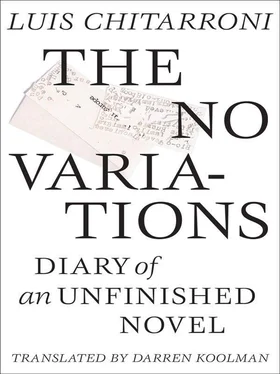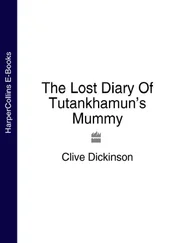9) That he also wrote a play in Alexandrines, La Calumnia , and shorter play in three acts that he wrote in French ( Une Petite Gare Desafectée ) [but not in that order, says Eiralis].
As one sees, they [these biographical notes] don’t even reach ten, which are distributed among twelve chapters. Perfect economy. Rightly or wrongly, one can complain (in other words, give thanks) “that the sparse information deprived me even of those two guides that remain after I empty myself of everything else to begin the writing process: ignorance and unpreparedness” (Chap. I). And then: “that the questionable dates and chronology in general will relieve me [exempt me] of those two circumstances that are fatal to writing: Continuing to live [Being alive], being awake” (Chap.VI).
The Excluded
The Reference The Referent
He lived at quite a distance from her body (1), which suited him because his body had become (or he transformed it into) a kind of [surd] transmitter of resonances, the majority [of them] going unanswered. For a while it was believed these resonances or vibrations were meant for someone in particular, until the belief became a solid conviction (2). That someone, the recipient of these transmissions, might have been the daughter of a certain accountant [Elvioapeles Momigliano] (3), a girl he admired unreservedly (4, see after “La mia figlia”), who worked as an administrator in one of the schools, whom he pursued determinedly, or instead of a girl, it could have been a diffident youth, one with a furtive gaze (5, Proust), a student of a subject he cannot recall (6). The first case is intriguing: we can only guess that she must have extracted from these messages some small or mysterious residue of what was communicated in the originals; of the latter case, through his prudence and obstinacy [ tenacity ], some flattering suggestion was perhaps received, something propitiatory though inhibitory (7, Lampedusa). But let’s forget about them for the time being. There will always be another occasion .
Of the various principles and scruples of conscience that governed the life of Enzo Nicosi (1913–1979/80), or at least the scruples he mentioned when he was alive, there is one in particular that casts light on his [predominant] tendency of speaking about one thing with reference to something else (in order to affirm that this other thing [always] evokes the former, whether because of the aptness or remoteness of the comparison), which is illustrated by quoting the following: “Latin literature is the most important solely because it was preceded by the Greek” and “I cannot speak or write without disorientation” (8).
That the first (9, Galileo, Dialogue …) (10, Hume …)
In 1958, when most of us first got to know him (11, Funes, second hand, Flaubert, Bovary — description of school briefcase), he was [already] “the man who would help guide us in life,” which was expressed with a kind of negative clairvoyance [like the capability] (12, Keats, Shelley, Coleridge) by our parents in those circumstances in which most of us, being part-time pupils at the Balmoral of Adrogué, were demanding explanations for our extraordinary regimen of study. Even then he was incredibly antiquated, pompous, withered, and lacked any peculiarities to set him apart from others. His moustache was trimmed according to the fashion of the times; it resembled that of many others of a certain age (including Miss Aserson) who kept those kinds of moustaches, which our parents admired for being like those of Errol Flynn, Clark Gable, Laurence Olivier, Ángel Magaña (deleted in final version, 13) … Many years later, once we saw through his mask, that symbol of his claudication, we summoned the image of Von Aschenbach, as interpreted by Dirk Bogarde in the Visconti film (14, reference to Gathorne-Hardy, anecdote in the book about English public schools).
We first learned that Balmoral should be stressed in the second syllable, correcting the local habit of stressing the first syllable of every foreign word that looked Anglo-saxon in origin (or the last syllable of every word that looked French). Then, being a wise instructor in the ideals of Benjamin Constant’s, he left us alone with a bunch of riddles to solve.
The origin of this strange calling, this way of instructing pupils, this way of addressing people in general — never directly — of dropping clues without ever hitting the nail on the head [the mark], seems to be in the way he himself was educated — or technically, in something he learned before receiving any formal instruction, something that happened not too far away in Lobos.
Orphaned at a young age, he was adopted by aunts who got their money’s worth when they sold, for a good price, the umbilical cord that nearly strangled him (15), for he spent his early years listening only to them. “Girl, open the shutters so Phoebus’s rays can unsettle the Lord’s diadem,” he remembered the eldest asking her younger sister when she wanted some light in her room. Pilar Rosario and Adelaida Barriolo … referred to eggs as “homemade abortions”; to rides downtown in a sulky or tilbury as “baleful journeys to the ninth circle.” Adelaida’s only suitor, an Englishman in the merchant navy, was received by Pilar with the question, “A vicissitudinous journey, was it?” The two women were known as the “Belfry Owls.”
After his aunts — who always repeated the same not very bookish stories — dates and people seem to have evaporated from his life. Perhaps it was because the people he met made his aunts seem bookish by comparison. But, some fifteen years after his first class at the Balmoral, and fifteen years before Enzo Nicosi’s death, certain anecdotes, like suspended whispers, began repeating themselves in places suited to abuses such as repetition (Kingsmill). A mascot, an English Setter — named Bramwell — was given to him as a thank you gift from Mr. Netbro’s [T. Lebron’s] daughters, and not only did it become his pet, but it was perhaps the only living creature about which he ever spoke with true affection. The fact is, he was going through a phase, whether he knew it or not, of wanting to be part of an English tradition (Ackerley, T. H. White). That symmetry, marked not so much in geometrical terms or by the equable disposition of objects in space, but temperamentally, as in the feeling of surprise one gets in discovering hidden objects [treasures] after years of searching, and seeing they are located at equal distances away from two equally terrible catastrophes; somewhere herein lies the indemonstrable [indescribable] artistic temperament others persist in attributing to him.
A game of tennis is perhaps the only way to see it in the open, one without a commentator. He’d learned to play in Lobos with his aunts, and his playing was — according to those who witnessed it — a perfect testament of that apprenticeship. A witness told the story many times [Bioy père, El matrero ] of when he played a game of doubles and tried handicapping his opponent — one of the accountant’s daughters — by aiming for her ring finger, specifically the sovereign in the ring her godmother Barriole gave her for her confirmation. He and his partner — a young man who had also been taking lessons — were winning emphatically ( score :?), and it was one of those happy occasions he’d later recall with avid boasting. But the accountant’s daughter wanted to quit before the second set, convinced her side would be routed; whereby he, her instructor, had to suffer, earlier than he expected to, the absence of his favorite pupil; and so, for the length of an entire weekend, he was divorced from her, separated from the ring that betokened her, the only seal that approved his existence, the only emblem that secured his identity. According to entries found in his only known diary, the separation resulted in, by turns, nights wracked by insomnia and sleep wracked by nightmares. The following entry records his bewilderment: “ The ring, not the book . But I wake up groping, knowing they’re the same. That I’ve kissed her, not him. The atrocious derelict . What made me kiss her. The hope of a result is the strength that gives us a weakness for rejoicing. Mutual.”
Читать дальше












